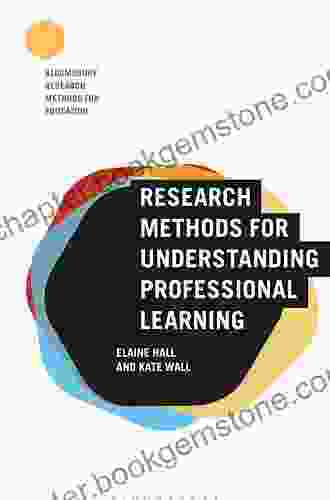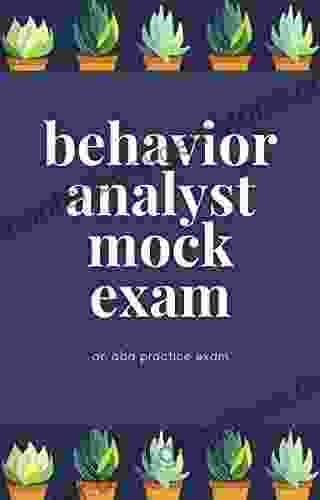Research Methods For Understanding Professional Learning

Professional learning is essential for educators to stay up-to-date on best practices and improve their teaching skills. However, understanding how professional learning works and how to make it more effective can be challenging.
Research methods can provide valuable insights into the processes and outcomes of professional learning. By using different research methods, researchers can explore the complex factors that influence professional learning and develop evidence-based recommendations for improving its effectiveness.
4.9 out of 5
| Language | : | English |
| File size | : | 13958 KB |
| Text-to-Speech | : | Enabled |
| Screen Reader | : | Supported |
| Enhanced typesetting | : | Enabled |
| Word Wise | : | Enabled |
| Print length | : | 387 pages |
Qualitative Research Methods
Qualitative research methods are used to collect and analyze non-numerical data, such as interviews, observations, and documents. These methods can provide rich insights into the experiences and perspectives of educators and other stakeholders involved in professional learning.
Some of the most common qualitative research methods used to study professional learning include:
- Interviews: Interviews involve asking educators questions about their experiences with professional learning. Interviews can be conducted individually or in groups, and they can be structured or unstructured.
- Observations: Observations involve watching educators engaged in professional learning activities. Observations can be conducted in a variety of settings, such as classrooms, workshops, and online learning environments.
- Document analysis: Document analysis involves examining written materials related to professional learning, such as lesson plans, curriculum materials, and professional development plans.
Quantitative Research Methods
Quantitative research methods are used to collect and analyze numerical data, such as surveys, tests, and experimental data. These methods can provide objective evidence about the effectiveness of professional learning programs and identify trends and patterns in professional learning.
Some of the most common quantitative research methods used to study professional learning include:
- Surveys: Surveys involve asking educators to complete questionnaires about their experiences with professional learning. Surveys can be administered online, by mail, or in person.
- Tests: Tests can be used to measure educators' knowledge and skills before and after they participate in professional learning. Tests can be standardized or developed specifically for a particular study.
- Experimental studies: Experimental studies involve randomly assigning educators to different professional learning conditions. This allows researchers to compare the effectiveness of different professional learning programs and identify the factors that contribute to success.
Mixed Methods Research
Mixed methods research combines qualitative and quantitative research methods to provide a more comprehensive understanding of professional learning. Mixed methods studies can explore the complex interactions between different factors and provide insights that would not be possible with either qualitative or quantitative methods alone.
For example, a mixed methods study might use interviews to collect data on educators' experiences with professional learning and then use surveys to collect data on the impact of professional learning on student achievement.
Importance of Context
When conducting research on professional learning, it is important to consider the context in which professional learning takes place. The context includes factors such as the school culture, the district policies, and the individual needs of educators.
By considering the context, researchers can better understand how professional learning is shaped by its environment and how to make professional learning more effective in different contexts.
Role of Theory
Theory plays an important role in guiding research design and interpreting research findings. Theory provides a framework for understanding the processes and outcomes of professional learning and helps researchers to make sense of their data.
There are many different theories that can be used to study professional learning. Some of the most common theories include:
- Social constructivism: Social constructivism is a theory that emphasizes the role of social interaction in learning. According to social constructivism, learners construct knowledge through their interactions with others.
- Situated learning: Situated learning is a theory that emphasizes the importance of context in learning. According to situated learning, learning is best when it is embedded in real-world situations.
- Transformative learning: Transformative learning is a theory that emphasizes the transformative power of learning. According to transformative learning, learning can lead to deep changes in beliefs, values, and worldviews.
Research methods can provide valuable insights into the processes and outcomes of professional learning. By using different research methods, researchers can explore the complex factors that influence professional learning and develop evidence-based recommendations for improving its effectiveness.
When conducting research on professional learning, it is important to consider the context in which professional learning takes place and the role of theory in guiding research design and interpreting research findings.
By using rigorous research methods, researchers can contribute to a better understanding of professional learning and help to improve the quality of teaching and learning.
4.9 out of 5
| Language | : | English |
| File size | : | 13958 KB |
| Text-to-Speech | : | Enabled |
| Screen Reader | : | Supported |
| Enhanced typesetting | : | Enabled |
| Word Wise | : | Enabled |
| Print length | : | 387 pages |
Do you want to contribute by writing guest posts on this blog?
Please contact us and send us a resume of previous articles that you have written.
 Best Book
Best Book Page Flip
Page Flip Bookshelf
Bookshelf Literary loom
Literary loom Chapter
Chapter Bookish
Bookish PageTurner
PageTurner Bibliophile
Bibliophile Story
Story Inkwell
Inkwell Bookworm
Bookworm Labyrinth
Labyrinth Plot Twist
Plot Twist Prose
Prose Paperback
Paperback Storyteller
Storyteller Sanctuary
Sanctuary Fiction
Fiction Reading
Reading Chronicle
Chronicle Read
Read Becki Willis
Becki Willis Ali Khan
Ali Khan John Muir
John Muir Achref Hassini
Achref Hassini H M Conroy
H M Conroy Iain Campbell
Iain Campbell Lena Diaz
Lena Diaz Isla Gordon
Isla Gordon Frederick Forsyth
Frederick Forsyth Rolls Canardly
Rolls Canardly Philip Donlay
Philip Donlay Stanley Cohen
Stanley Cohen Bruce Berglund
Bruce Berglund Achim K Krull
Achim K Krull Shaan Patel
Shaan Patel Ronie Kendig
Ronie Kendig Lee Gutteridge
Lee Gutteridge Mark Ryan
Mark Ryan Marteeka Karland
Marteeka Karland Ray Scapinello
Ray Scapinello Catherine Carrigan
Catherine Carrigan Francis Parkman
Francis Parkman Chris Losh
Chris Losh Cynthia Snyder Dionisio
Cynthia Snyder Dionisio Eboo Patel
Eboo Patel Seymour Lipschutz
Seymour Lipschutz Brian Burke
Brian BurkeK D
 V S Naipaul
V S Naipaul Rob Soria
Rob Soria Shawna Richer
Shawna Richer Dan O Neill
Dan O Neill Ron Siliko
Ron Siliko Lori A Smolin
Lori A Smolin Stuart Woods
Stuart Woods Argo Brothers
Argo Brothers Greyson Ferguson
Greyson Ferguson Julia Alvarez
Julia Alvarez Ray Krueger Koplin
Ray Krueger Koplin Kanchan Suyash
Kanchan Suyash Jamie Watts
Jamie Watts Ian Ball
Ian Ball Culture Smart
Culture Smart Alan R Cole
Alan R Cole Ryan Judkins
Ryan Judkins Leela Punyaratabandhu
Leela Punyaratabandhu Soon Ho Jeon
Soon Ho Jeon Pam Coburn
Pam Coburn Petru Popescu
Petru Popescu Jermaine Marshall
Jermaine Marshall Selin Kiazim
Selin Kiazim Marc Cameron
Marc Cameron Sarah Retter
Sarah Retter Arden Pala
Arden Pala P M Lane
P M Lane Dan Davis
Dan Davis Abdul Al Lily
Abdul Al Lily Sophy Hunte
Sophy Hunte Tim Keesee
Tim Keesee Hugh Monney
Hugh Monney David Wilkinson
David Wilkinson Aaron H Goldberg
Aaron H Goldberg Luis Angel Echeverria
Luis Angel Echeverria Richard Post
Richard Post Jack L Roberts
Jack L Roberts Alf Alderson
Alf Alderson Antoinette May
Antoinette May Andrew Jalbert
Andrew Jalbert Franklin Horton
Franklin Horton Scott Dominic Carpenter
Scott Dominic Carpenter Robert Vaughn
Robert Vaughn Rough Guides
Rough Guides Andre Moubarak
Andre Moubarak Robert Arellano
Robert Arellano Mat Gilfedder
Mat Gilfedder One Exam Prep
One Exam Prep Kaplan Test Prep
Kaplan Test Prep Dave Hadfield
Dave Hadfield Tad Fitch
Tad Fitch Abby Jimenez
Abby Jimenez Saeid Atoofi
Saeid Atoofi Silke Noll
Silke Noll Katherine Routledge
Katherine Routledge Jitender Singh
Jitender Singh Gregory Crouch
Gregory Crouch Maryetta Ackenbom
Maryetta Ackenbom Gary Westphalen
Gary Westphalen Wizer
Wizer Charlotte Dunford
Charlotte Dunford Edwin C Bearss
Edwin C Bearss Steven Konkoly
Steven Konkoly Jeffrey L Buller
Jeffrey L Buller John Carpenter
John Carpenter Maha Alkurdi
Maha Alkurdi Robert Edison Fulton
Robert Edison Fulton Mina Lebitz
Mina Lebitz M J Mcgrath
M J Mcgrath Jules Hayes
Jules Hayes Kate Hoskins
Kate Hoskins Mike Gibson
Mike Gibson Wolfgang Daunicht
Wolfgang Daunicht Howard Frank Mosher
Howard Frank Mosher Gen Tanabe
Gen Tanabe Matt Doeden
Matt Doeden Nicholas Ruddick
Nicholas Ruddick Christopher Black
Christopher Black Sian O Gorman
Sian O Gorman William Gilbert
William Gilbert Mark Kurlansky
Mark Kurlansky Asha Kaul
Asha Kaul Sally Miller
Sally Miller Jonathan Gourlay
Jonathan Gourlay Andrew Graham Yooll
Andrew Graham Yooll Sean Go
Sean Go Cynthia Swanson
Cynthia Swanson Pallas Snider
Pallas Snider Anne K Brown
Anne K Brown Ash Davidson
Ash Davidson Vb Leghorn
Vb Leghorn Guinevere Durham
Guinevere Durham Angie Papple Johnston
Angie Papple Johnston Michael Palin
Michael Palin Proper Education Group
Proper Education Group Kenny Dill
Kenny Dill Marjorie Agosin
Marjorie Agosin Sally Bendersky
Sally Bendersky Krishna Swaroop Achanta
Krishna Swaroop Achanta Allan Sefton
Allan Sefton Julia A Simms
Julia A Simms Springer Publishing Company
Springer Publishing Company Deborah Manley
Deborah Manley Larry Gonick
Larry Gonick Abi Elphinstone
Abi Elphinstone Gerry Cheevers
Gerry Cheevers Jake Maddox
Jake Maddox Jacqueline Langwith
Jacqueline Langwith Geoffrey Wolff
Geoffrey Wolff Theodora Papatheodorou
Theodora Papatheodorou Ascencia
Ascencia 3rd Edition Kindle Edition
3rd Edition Kindle Edition Wayne Stewart
Wayne Stewart Rich Dossan
Rich Dossan Ray T Malbrough
Ray T Malbrough Hank Wysocki
Hank Wysocki David Archer
David Archer Second Edition New Edition Updated Revised...
Second Edition New Edition Updated Revised... Rob Eastaway
Rob Eastaway Tim Rock
Tim Rock Lee Mylne
Lee Mylne Sparknotes
Sparknotes Borja Loma Barrie
Borja Loma Barrie Sarah Spencer
Sarah Spencer Sylvia Day
Sylvia Day Iman Hami
Iman Hami Dk Eyewitness
Dk Eyewitness Hollie Bell Schinzing
Hollie Bell Schinzing Jayme Adelson Goldstein
Jayme Adelson Goldstein John Gookin
John Gookin Conner Gorry
Conner Gorry Dave Hanson
Dave Hanson David A Goldstein
David A Goldstein Sport Hour
Sport Hour Steve Hindman
Steve Hindman Phil Martin
Phil Martin Janet Engle
Janet Engle Julian Mcdougall
Julian Mcdougall Jason Elliot
Jason Elliot Elizabeth Bohorquez Rn
Elizabeth Bohorquez Rn Jasmina Susak
Jasmina Susak Aftab Hamid
Aftab Hamid John Mclachlan
John Mclachlan Gretel Ehrlich
Gretel Ehrlich Clive Cussler
Clive Cussler Ric Hajovsky
Ric Hajovsky Nina Belile
Nina Belile Brandon Stanton
Brandon Stanton Rezaul Bahar
Rezaul Bahar Sue Feldman
Sue Feldman Benedict Allen
Benedict Allen David Chapin
David Chapin Denise Hamilton
Denise Hamilton Magi Nams
Magi Nams Timothy Dickeson
Timothy Dickeson Patrick Hill
Patrick Hill Stewart M Green
Stewart M Green Ken Ilgunas
Ken Ilgunas Aldo Leopold
Aldo Leopold Bryan Gillis
Bryan Gillis A J Mackinnon
A J Mackinnon Ariel Dorfman
Ariel Dorfman Cherise Sinclair
Cherise Sinclair Stacey Barrett
Stacey Barrett William D Frank
William D Frank Said Hasyim
Said Hasyim Kenneth Pickering
Kenneth Pickering Abul K Abbas
Abul K Abbas Nick Popaditch
Nick Popaditch Edward C Klatt
Edward C Klatt Ghassan Moussawi
Ghassan Moussawi Kathryn Reed
Kathryn Reed Nathan Turner
Nathan Turner Loris Chen
Loris Chen Aayush Upadhyay
Aayush Upadhyay Jens Eriksen
Jens Eriksen Bob Cary
Bob Cary Obongifreke Inyang
Obongifreke Inyang Vidya Subramanian
Vidya Subramanian Goldmine Reads
Goldmine Reads Anna Greathead
Anna Greathead Tim Burford
Tim Burford Katherine Nouri Hughes
Katherine Nouri Hughes Not For Tourists
Not For Tourists Gord Stellick
Gord Stellick Lizzie Lane
Lizzie Lane Eliot Schrefer
Eliot Schrefer A M Shine
A M Shine Omari Bouknight
Omari Bouknight Adam Mansbach
Adam Mansbach Edwidge Danticat
Edwidge Danticat Andrew Grant Wood
Andrew Grant Wood Mary E Trimble
Mary E Trimble 5th Edition Kindle Edition
5th Edition Kindle Edition Sir John Franklin
Sir John Franklin Allyson Ambrose
Allyson Ambrose Anthony Dalton
Anthony Dalton Philipp Winterberg
Philipp Winterberg Alex Kerr
Alex Kerr Jane Clapp
Jane Clapp Sherryl Woods
Sherryl Woods Bookrags Com
Bookrags Com Eriko Sato
Eriko Sato 2 Edition Kindle Edition
2 Edition Kindle Edition Samuel Willard Crompton
Samuel Willard Crompton Orji Onyebuchi
Orji Onyebuchi Greg Jacobs
Greg Jacobs Ethelyn Geschwind
Ethelyn Geschwind Stuart James Amei
Stuart James Amei Judy Lipson
Judy Lipson Joie Jager Hyman
Joie Jager Hyman P T Shank
P T Shank Brad Taylor
Brad Taylor Stephen Hui
Stephen Hui Penelope Douglas
Penelope Douglas Dean Koontz
Dean Koontz April Stephens
April Stephens Jonathan Raban
Jonathan Raban Peter Schinkai
Peter Schinkai Yatir Nitzany
Yatir Nitzany Daniel Francis
Daniel Francis Frank Walters
Frank Walters Mike Humfreville
Mike Humfreville Ryan Dale
Ryan Dale 7th Edition Kindle Edition
7th Edition Kindle Edition Bernard Cornwell
Bernard Cornwell Ashley Oliphant
Ashley Oliphant Sheila O Flanagan
Sheila O Flanagan Blake Boles
Blake Boles Tina Tam
Tina Tam Aiva Books
Aiva Books Pam Gaffin
Pam Gaffin Jennifer Kingsley
Jennifer Kingsley Dana Fredsti
Dana Fredsti Patrick Leigh Fermor
Patrick Leigh Fermor Doug Knutson
Doug Knutson Joe Glickman
Joe Glickman Domingo Faustino Sarmiento
Domingo Faustino Sarmiento Tahir Shah
Tahir Shah Mark Richardson
Mark Richardson Samantha Allen
Samantha Allen Rohan Agarwal
Rohan Agarwal Kyoan
Kyoan Mithu Sengupta
Mithu Sengupta Peter Heller
Peter Heller Tiziano Terzani
Tiziano Terzani W H Hudson
W H Hudson Rae Ellen Lee
Rae Ellen Lee Benjamin Southerland
Benjamin Southerland Bruce Gernon
Bruce Gernon Moh Kolli Carnet
Moh Kolli Carnet Todd Denault
Todd Denault John T Moore
John T Moore Vibrant Publishers
Vibrant Publishers Adam J Wright
Adam J Wright Eric Zweig
Eric Zweig Peter Grant
Peter Grant Lilia Moritz Schwarcz
Lilia Moritz Schwarcz Eric D Miller
Eric D Miller Chaz Van Heyden
Chaz Van Heyden Ace Atkins
Ace Atkins R G Richardson
R G Richardson Timothy Egan
Timothy Egan Marianne Hering
Marianne Hering Luca Brambilla
Luca Brambilla Jennifer Bohnet
Jennifer Bohnet Steve Berry
Steve Berry Gavin Francis
Gavin Francis Lisa See
Lisa See Viktoriya Tutev
Viktoriya Tutev James A Cashin
James A Cashin Baby Professor
Baby Professor Murray Shukyn
Murray Shukyn Arthur Chichester
Arthur Chichester Kd Sofia Sigil
Kd Sofia Sigil Alan Pritchard
Alan Pritchard John Steinbeck
John Steinbeck Oscar Hijuelos
Oscar Hijuelos Eva Zonnios
Eva Zonnios Christian Wolfe
Christian Wolfe Todd Lammle
Todd Lammle Steve Schwartz
Steve Schwartz Marshal Shlafer
Marshal Shlafer Belinda Jones
Belinda Jones Nathan Bair
Nathan Bair W Scott Koenig
W Scott Koenig Peter Levin
Peter Levin Glenda Durano
Glenda Durano Jon Sterngass
Jon Sterngass John Lyons
John Lyons Todd Phillips
Todd Phillips R Wayne Stacy
R Wayne Stacy R A Dalkey
R A Dalkey Vincent Ardizzone
Vincent Ardizzone Sharon Boyd
Sharon Boyd Eileen Tracy
Eileen Tracy Claire Agutter
Claire Agutter Con Coughlin
Con Coughlin Nick Hobgood
Nick Hobgood Heather Fawcett
Heather Fawcett Joel A Dombrowski
Joel A Dombrowski Aaron Chapman
Aaron Chapman Shrm Test Prep Team
Shrm Test Prep Team Tom Mattson
Tom Mattson Murray R Spiegel
Murray R Spiegel 2nd Edition Kindle Edition
2nd Edition Kindle Edition Mauricio Fau
Mauricio Fau Richard P Clem
Richard P Clem Lynn Austin
Lynn Austin Ida Pfeiffer
Ida Pfeiffer John Pitt
John Pitt Steven Cowie
Steven Cowie Katie Mangelsdorf
Katie Mangelsdorf Mary Jane Walker
Mary Jane Walker Julie Miller
Julie Miller James Barrington
James Barrington Mark Walters
Mark Walters Stephanie Rosenbloom
Stephanie Rosenbloom George Cantor
George Cantor Second Edition Kindle Edition
Second Edition Kindle Edition Simone Braverman
Simone Braverman William S Crooker
William S Crooker Poetry Row
Poetry Row Jim Ziolkowski
Jim Ziolkowski Michael Reid
Michael Reid Stewart Giles
Stewart Giles A R Vasishtha
A R Vasishtha Aaron Robinet
Aaron Robinet K Reynolds James
K Reynolds James John King
John King Bhavesh Mamtani
Bhavesh Mamtani Johnny Lung
Johnny Lung Lucy Postgate
Lucy Postgate Matthew Bowling
Matthew Bowling Spire Study System
Spire Study System Achille Rubini
Achille Rubini George Bernard Shaw
George Bernard Shaw Adam Woog
Adam Woog Sjaak Laan
Sjaak Laan S Elia
S Elia Melissa Abramovitz
Melissa Abramovitz Dr Luz Claudio
Dr Luz Claudio L Blair
L Blair Robert Jackson Bennett
Robert Jackson Bennett Tara L Kuther
Tara L Kuther Josh Pahigian
Josh Pahigian Carla Hayden
Carla Hayden Mark Tredinnick
Mark Tredinnick Stephen C Doyle
Stephen C Doyle F R Lifestyle
F R Lifestyle Corinna Cooke
Corinna Cooke Greg Seymour
Greg Seymour Alberto Granado
Alberto Granado Eleanor Hogan
Eleanor Hogan Sophie Claire
Sophie Claire Henry Walter Bates
Henry Walter Bates Michael Mcinnis
Michael Mcinnis Peter Avery
Peter Avery Shirley Soltesz Steiner
Shirley Soltesz Steiner Elin Hilderbrand
Elin Hilderbrand Isobel Williams
Isobel Williams Phil G Tang
Phil G Tang Joyce Carol Oates
Joyce Carol Oates Karen Marie Moning
Karen Marie Moning Carla Mooney
Carla Mooney Aaron Linsdau
Aaron Linsdau Tony Barnhart
Tony Barnhart Jeff Gill
Jeff Gill Christian Heath
Christian Heath Andrew Lees
Andrew Lees Blake Sebring
Blake Sebring Kathy Campitelli
Kathy Campitelli Steven Hawthorne
Steven Hawthorne Bob Goddard
Bob Goddard Jack Summers
Jack Summers Grant Blackwood
Grant Blackwood Knowledge Tree
Knowledge Tree Dave Butler
Dave Butler John Harrison
John Harrison Ian Durston
Ian Durston Book Note Gifts
Book Note Gifts Perce Harpham
Perce Harpham Snap Summaries
Snap Summaries Tayyip Oral
Tayyip Oral Deb Spera
Deb Spera David Aretha
David Aretha David Quammen
David Quammen Termite Terry Singleton
Termite Terry Singleton Tracy Brown Collins
Tracy Brown Collins Achy Obejas
Achy Obejas Rob Vollman
Rob Vollman George Sandford
George Sandford Steven C Dinero
Steven C Dinero Penny Hastings
Penny Hastings Maria Golia
Maria Golia Liisa Vexler
Liisa Vexler Nate Turner
Nate Turner Doug Feldmann
Doug Feldmann Jeevan Vasagar
Jeevan Vasagar Morten Lund
Morten Lund James Oseland
James Oseland Michael J Totten
Michael J Totten Jane Yolen
Jane Yolen Robert Birkby
Robert Birkby Peter Mark Roget
Peter Mark Roget 1st Edition Kindle Edition
1st Edition Kindle Edition Gary Wonning
Gary Wonning Alfie Kohn
Alfie Kohn Insight Guides
Insight Guides Charles Euchner
Charles Euchner Firefighter Now
Firefighter Now Natalya Androsova
Natalya Androsova Daisy Taylor
Daisy Taylor Daniel Pautrat
Daniel Pautrat Ken Baird
Ken Baird Timothy Hallinan
Timothy Hallinan Kristine Ellingson
Kristine Ellingson Diana Gabaldon
Diana Gabaldon Peter Robb
Peter Robb Scott Pratt
Scott Pratt Brian Winter
Brian Winter Zachary Willey
Zachary Willey Norman Hall
Norman Hall Paul Brummell
Paul Brummell Adam Kimelman
Adam Kimelman Debbie J Jenkins
Debbie J Jenkins Kerry Colburn
Kerry Colburn Brian Smith
Brian Smith Tim Macgabhann
Tim Macgabhann Risto Pakarinen
Risto Pakarinen Samuel T Reddy
Samuel T Reddy Paul Crask
Paul Crask Laverne Mordella
Laverne Mordella Magic Guidebooks
Magic Guidebooks Steven L Emanuel
Steven L Emanuel Allison Williams
Allison Williams Mieke Leenders
Mieke Leenders 6th Edition Kindle Edition
6th Edition Kindle Edition Boris Kachka
Boris Kachka Patrick Trese
Patrick Trese Triumphant Test Prep
Triumphant Test Prep Mathivanan Palraj
Mathivanan Palraj Felicity Pine
Felicity Pine Achusim Michael
Achusim Michael William E Hearn
William E Hearn Katie Peuvrelle Ma
Katie Peuvrelle Ma R I Chalmers
R I Chalmers Cpt Exam Prep Team
Cpt Exam Prep Team James Rushforth
James Rushforth Anna Kaminski
Anna Kaminski Lan Sluder
Lan Sluder Brian J Sommers
Brian J Sommers Paul Heiney
Paul Heiney M J Rose
M J Rose Kenny Tan
Kenny Tan
Light bulbAdvertise smarter! Our strategic ad space ensures maximum exposure. Reserve your spot today!
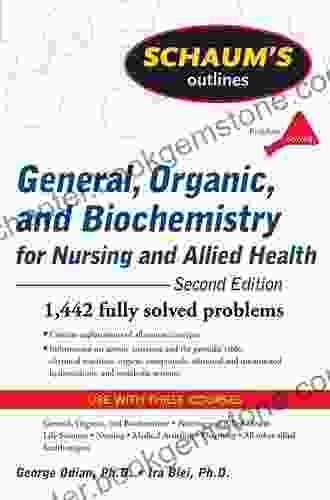
 Stan WardSchaum's Outline of General, Organic, and Biochemistry for Nursing and Allied...
Stan WardSchaum's Outline of General, Organic, and Biochemistry for Nursing and Allied...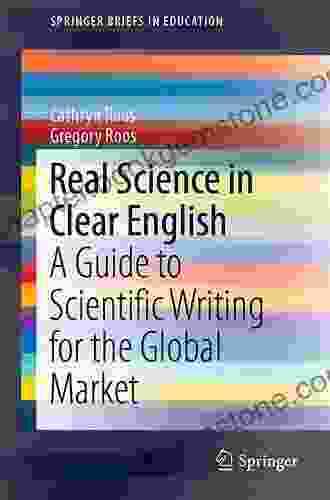
 John Dos PassosThe Ultimate Guide to Scientific Writing for the Global Market: Unlocking...
John Dos PassosThe Ultimate Guide to Scientific Writing for the Global Market: Unlocking... Camden MitchellFollow ·6.5k
Camden MitchellFollow ·6.5k Mason PowellFollow ·2.9k
Mason PowellFollow ·2.9k Roger TurnerFollow ·4.4k
Roger TurnerFollow ·4.4k Herman MelvilleFollow ·3.6k
Herman MelvilleFollow ·3.6k Randy HayesFollow ·4.8k
Randy HayesFollow ·4.8k Paulo CoelhoFollow ·5.7k
Paulo CoelhoFollow ·5.7k Harvey BellFollow ·19.1k
Harvey BellFollow ·19.1k Alex FosterFollow ·19.9k
Alex FosterFollow ·19.9k
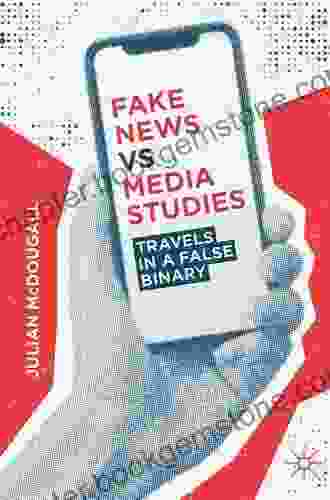
 Elias Mitchell
Elias MitchellTravels in False Binary: Exploring the Complexities of...
In a world rigidly...

 Ray Blair
Ray BlairTreason: An Electrifying Chapter in the Stone Barrington...
Prepare yourself for an adrenaline-fueled...

 Bryan Gray
Bryan GrayGo De Rass To Sleep Jamaican Translation: A Comprehensive...
The vibrant and...

 Victor Turner
Victor TurnerFearless: One Woman, One Kayak, One Continent
In 2018, Sarah...
4.9 out of 5
| Language | : | English |
| File size | : | 13958 KB |
| Text-to-Speech | : | Enabled |
| Screen Reader | : | Supported |
| Enhanced typesetting | : | Enabled |
| Word Wise | : | Enabled |
| Print length | : | 387 pages |


